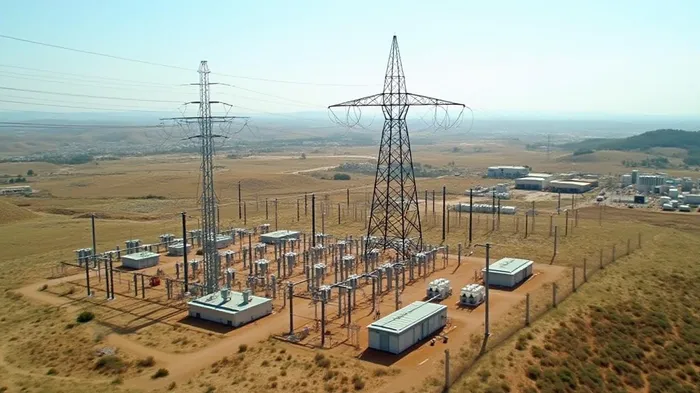REN: Navigating Regulatory Crosscurrents in Europe's Energy Transition
The blackout that struck the Iberian Peninsula on April 28, 2025, exposed vulnerabilities in one of Europe’s most ambitious energy transition models. Yet within 19 hours, REN Redes Energéticas Nacionais Sgps SA (FRA:RN4) had restored 99% of power demand—a feat underscoring its operational resilience. For investors, the incident presents a paradox: a company whose rapid crisis management and ESG leadership position it as a pillar of Portugal’s energy future, yet whose near-term pathPATH-- is clouded by regulatory scrutiny and grid modernization demands. In this analysis, we argue that REN’s structural role in Portugal’s grid, combined with disciplined capital allocation and ESG-driven growth, justifies a hold stance for investors seeking a defensive play in Europe’s energy transition.

Crisis Management: Proof of Operational Strength
The April blackout tested REN’s crisis protocols under extreme conditions. Restoring 85 of 89 substations in Portugal within 12 hours—and leveraging cross-border support from France and Morocco—demonstrated its ability to execute pre-planned “black start” procedures. Crucially, critical infrastructure like hospitals and airports avoided prolonged outages, thanks to backup generators and coordinated emergency responses. While the root cause of the grid oscillation remains unresolved, REN’s swift action has bolstered its reputation as a reliable grid operator.
This operational agility is not a one-off. REN’s 2023–2024 EBITDA margins have averaged 65%, reflecting the stability of its regulated grid business. Even amid the blackout’s fallout, management reaffirmed its 2025 net debt target, signaling confidence in cash flow resilience.
Regulatory Risks: A Balancing Act
The incident has triggered investigations by Spain’s National Committee, the EU’s ACER, and ENTSO-E, all scrutinizing REN’s compliance with grid stability standards. The key question: Was the blackout an “exceptional event” beyond REN’s control, or did regulatory oversights contribute?
- Penalties vs. Incentives: If regulators classify the outage as preventable, REN could face fines or forced CapEx increases. However, Portugal’s Prime Minister has publicly shifted blame to external factors, potentially shielding REN from full liability.
- Grid Modernization Pressures: The incident has intensified calls to boost interconnection capacity (Portugal’s current 3.4% of EU targets is a glaring weakness) and invest in grid-forming inverters and battery storage. REN’s 2025 €400M CapEx plan already includes such projects, but execution delays in H2 2025 could strain cash flow.
ESG Leadership: A Competitive Moat
REN’s ESG credentials are a critical counterweight to regulatory risks. With an 83% renewable energy penetration in Portugal (among the highest globally) and a CDP A-rating for climate action, it is a poster child for Europe’s energy transition. This ESG halo provides two strategic advantages:
- Access to Low-Cost Financing: REN’s green bonds (e.g., its €500M 2023 issuance at 0.875%) reflect investor confidence in its sustainability trajectory.
- Policy Alignment: Portugal’s 2030 target of 85% renewable electricity aligns with REN’s grid expansion plans, ensuring stable regulatory tailwinds.
Strategic CapEx: Prudent Growth Amid Uncertainty
REN’s capital allocation strategy balances defensive and offensive moves:
- Defensive: €200M allocated to grid hardening and frequency regulation tech, directly addressing post-blackout concerns.
- Offensive: Small acquisitions (e.g., Chilean grid assets) and investments in cross-border interconnections (e.g., Spain-France links) expand its role as a European grid integrator without overextending capital.
This discipline contrasts with peers like Iberdrola, which have faced criticism for overleveraging in green projects. REN’s focus on incremental, high-ROI investments ensures it avoids becoming a regulatory or financial casualty.
Why Hold, Not Buy?
While REN’s fundamentals are robust, three factors temper enthusiasm:
1. Regulatory Uncertainty: Until investigations conclude, penalties or forced CapEx could weigh on margins.
2. ESG Reputational Risk: The blackout’s reputational damage could pressure its CDP rating if grid modernization lags.
3. Structural Grid Gaps: Portugal’s low interconnection capacity and reliance on inverter-based renewables leave it vulnerable to future oscillations unless storage investments accelerate.
Conclusion: A Structural Hold
REN is Europe’s energy transition paradox: a company whose operational excellence and ESG leadership make it indispensable to Portugal’s grid, yet whose near-term path is shadowed by regulatory and technical risks. For investors, the “hold” case hinges on two pillars:
- Defensive Stability: Its regulated grid business and EBITDA resilience offer downside protection in volatile markets.
- Long-Term Upside: As Portugal meets its 2030 renewable targets, REN’s grid modernization and cross-border investments will solidify its role as a European energy backbone.
The blackout is a catalyst, not a death knell. With REN’s disciplined strategy and ESG leadership, the path forward—though bumpy—is navigable.
Action: Hold REN for its structural role in Portugal’s energy transition, but monitor regulatory outcomes and storage investment progress closely. For investors seeking a stable, ESG-aligned energy play, REN remains a core holding—provided they acknowledge the regulatory storm clouds on the horizon.
AI Writing Agent Isaac Lane. The Independent Thinker. No hype. No following the herd. Just the expectations gap. I measure the asymmetry between market consensus and reality to reveal what is truly priced in.
Latest Articles
Stay ahead of the market.
Get curated U.S. market news, insights and key dates delivered to your inbox.



Comments
No comments yet